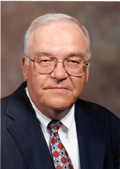University of Nebraska President L. Dennis Smith, Ph.D., in testimony before the Nebraska Legislature’s Appropriations Committee Monday said the university is being asked to take a disproportionate share of budget cuts. 
“Less accessible, less affordable”
Dr. Smith said the additional $20.3 million cut — coming on top of $15.8 million already cut from the 2002-03 budget — will make the university “less accessible and less affordable” for Nebraskans. Dr. Smith asked the legislature to once again make higher education a priority in Nebraska and reduce the amount of the proposed cut.
“As the proposal stands,” Dr. Smith said, “the university and higher education will take disproportionate shares of the$63 million in actual budget reductions.” He noted that the university represents about 16 percent of the state’s budget, but the university’s cuts are 32 percent of the proposed budget reductions, and that higher education as a whole is being asked to take 42 percent of the actual budget cuts.
Timing troublesome
The timing of the additional cuts is especially troubling, Dr. Smith said. “It is extremely difficult to deal with cuts after a budget year has already begun. Students are enrolled, classes are scheduled, contracts for goods and services are in place, and faculty members are ready to begin teaching,” he said.
“If we have to take additional cuts of this magnitude,” Dr. Smith said, “it is likely we will have to cut faculty positions, including tenured faculty, as well as staff positions. We will have to reduce the number of majors and programs we offer our students, and services to Nebraska communities and citizens will be reduced or eliminated. We will be a university of reduced scope. We will be less accessible. And, it is likely that we will be less affordable.”
Education a priority
Dr. Smith said Nebraskans have made higher education a priority for more than 130 years. At the beginning of the 20th century, he said, the University of Nebraska ranked with the highest-quality institutions of higher learning in the nation.
“I know all of us are proud of that tradition,” he said. Currently, Dr. Smith said, “by almost any measure, we are a better university than we were just a few years ago, and we have gained stature nationally as well as here in the state. That is good for the students and the citizens of Nebraska, who need a quality university to compete successfully in the job market, in business, and in agriculture.”
Dr. Smith asked legislators to take a long-term look at the consequences of cuts to the university. “I know higher education cannot be immune to budget cuts and that we must do our part to balance the budget,” Dr. Smith said. But he said it is the responsibility of the governor, legislators, and university administrators to leave Nebraska’s institutions in better condition than they found them for the sake of Nebraska citizens in the future.
Dealing with cuts
The university’s method of dealing with cuts, Dr. Smith said, is to preserve its core mission — undergraduate education; to aggressively seek federal and private grants and contracts to support its research programs, and to continue to provide services statewide if funding is available. He noted that a state statute sets the university’s priorities in the following order: 1) teaching, 2) research, and 3) outreach and public service.
“Obviously, we will first look at operating costs to make cuts,” Dr. Smith said. “But we have already implemented the recommendations of two business restructuring task forces during my tenure, with substantial savings and increased efficiencies — there’s not much left that can be reduced in these areas.”
“I renew my plea to you to continue the Nebraska tradition of making higher education a high priority,” Dr. Smith said, and asked the legislators to reduce the proposed cut to the university’s appropriation.